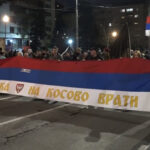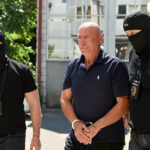- North Macedonia, Montenegro, Albania, Bosnia and Herzegovina Align with the European Sanctions
The EU candidate countries North Macedonia, Montenegro, Albania, Bosnia and Herzegovina, as well as Ukraine and the Republic of Moldova have extended sanctions targeting those responsible for undermining or threatening the territorial integrity, sovereignty and independence of Ukraine. These countries joined the EU Council decision of March 12, 2024, which renew the sanctions regime (travel restrictions for natural persons, freezing of assets and a ban on making funds to the listed individuals and entities) for another six months until September 15, 2024.
Serbia, although it is also a candidate for joining the European Union, did not support the decision of the EU Council. In this way, Belgrade continued its policy against joining the European sanctions related to Russia’s aggression against Ukraine, despite Brussels’ clear signals to align Serbian foreign and security policy with the position of the European Union.
On April 11, Serbian President Aleksandar Vučić reiterated Serbian position not to join sanctions against Russia. “Serbia’s position regarding the introduction of sanctions against Russia remains the same as it was eight days after the start of the conflict in Ukraine. In other words, sanctions against Russia will not be introduced,” he said.
- Serbia is trying to maintain good relations with France
Serbian President Aleksandar Vučić paid a two-day visit to France on April 8-9, where he met with French President Emmanuel Macron at the Élysée Palace.
After the meeting, in his Instagram, Vučić expressed hope that France would support Serbia in all areas, primarily in Serbia’s European path and dialogue with Priština.
French President Emmanuel Macron emphasized that the future of Serbia was in the European Union. “France is committed to Serbia’s future in the EU, the future that is being written now,” Macron wrote at the end of the meeting on the X network in Serbian Cyrillic to emphasize his good attitude towards Serbia and the Serbs.
“It is important that Serbia continues to specify its choices, aligning its views with European ones, and in this sense I remind you of the meeting in Tirana and the meeting with the President of Ukraine, Volodymyr Zelenskyy,” the French President emphasized in his address before the meeting with his Serbian counterpart. In this way, Macron reminded Vučić of the need to adhere to a common foreign and security policy with the EU in the context of Russia’s war against Ukraine.
On the eve of the meeting, the President of Serbia said that he would like to talk with his French counterpart about the expected accession of Kosovo to the Council of Europe, but the participants of the meeting did not comment on this topic.
Instead, after negotiations in Paris, Vučić announced that Serbia and France had reached an agreement on Belgrade’s purchase of Rafale fighter jets. According to him, the signing of the contract can be expected in about two months in the presence of the French President. That is, at the moment there is only the possibility of signing such an agreement.
Vučić’s visit shows the efforts of the Serbian leader to maintain mutually beneficial contacts with Serbia’s traditional allies in Western Europe. However, this task gets more complicated – due to Belgrade’s reluctance to join European sanctions against the Russian Federation and confrontation with Western countries due to Kosovo’s possible membership in the Council of Europe and the adoption of a resolution on Srebrenica at the UN General Assembly.
- In response to the Resolution on Srebrenica, Serbia will tell about the genocide of Serbs in the Second World War
On the eve of consideration by the UN General Assembly of the resolution on the genocide in Srebrenica, the leadership of Serbia announced possible Belgrade’s response to this decision.
In particular, if the resolution on Srebrenica is adopted, Serbia will submit to the UN General Assembly a resolution on the “genocide of Serbs” during the Second World War – in Kragujevac, Kraljevo and Jajinci (Serbia), as well as in Jasenovac (Croatia), the President of Serbia, Aleksandar Vučić, said on April 14. “About 90 times more people died there than in Srebrenica,” he added. Vučić emphasized that the proposed resolution would not mention who it was about. “We will not mention the Germans anywhere,” he said, in particular.
In fact, it is about official Belgrade, who has launched a campaign to “blur” the issue of Srebrenica by drawing attention to the suffering of the Serbs during World War II.
It was made the same day after the First Deputy Prime Minister and Foreign Minister Ivica Dačić announced that Serbia would send a protest to Croatia after Croatian police prevented the Serbian Minister of Diaspora from making an (unscheduled) visit to the former camp of the Second World War in Jasenovac. “This is not an incident, it is the official policy of Croatia, the policy of denial of crimes and genocide against the Serbian people,” Dačić emphasized in an official statement.
- Dodik threatens the secession of Republika Srpska
If there is a decision on the resolution on Srebrenica in the UN General Assembly, the Republika Srpska does not see any sense in remaining in Bosnia and Herzegovina, said President of the Republika Srpska Milorad Dodik after the meeting of the state leadership of Serbia and the leaders of the Republika Srpska. “We do not see any sense in remaining in BiH as an integral part of it, and we will regulate our status so that it can move on independently,” he added.
The US Embassy in Bosnia and Herzegovina announced after Dodik’s statement that the President of Republika Srpska was wrong to believe that the US would observe silently behind his separatist agenda to push Bosnia and Herzegovina into conflict. “Any attempt to secede from the entity or any other sub-state unit is an anti-Dayton action that will not be tolerated,” the statement said.
However, it is currently unknown about the intention of the leadership of the Republika Srpska to abandon plans for actual separation from BiH. The first step should be the decision to withdraw from the institutions of Bosnia and Herzegovina and adopt the RS’s own law on elections.
- Hungary will not support the resolution on Srebrenica and the accession of Kosovo to the Council of Europe
Hungary will vote against Kosovo’s membership in the Council of Europe in the Committee of Ministers of the Council of Europe and will not support the resolution on the recognition of the genocide in Srebrenica in the UN General Assembly.
This became known from a post by the Minister of Foreign Affairs of Hungary, Péter Szijártó, on social networks after his telephone conversation with the head of the Ministry of Foreign Affairs and Acting Prime Minister of Serbia, Ivica Dačić on April 13.
“Hungary is interested in the success of the dialogue between Belgrade and Priština, but Kosovo’s ongoing intention to join international organizations does not help this process. I confirmed that Hungary will vote against Kosovo’s membership in the Committee of Ministers of the Council of Europe and will not support the resolution on Srebrenica in the UN, nor any proposal that would lead to further escalation of tensions in the region,” Szijjártó said.
Hungary’s position on these two issues is a continuation of the policy of special relations between Budapest and Belgrade. Having an ally within the EU, Serbia can feel more confident pursuing policies that contradict the official position of the European Union.
- Priština warns of a military threat from Serbia
Kosovo Prime Minister Albin Kurti has warned that Serbia was building bases around the Kosovo border, planning to attack Kosovo.
He said this in a recent interview with the British The Telegraph.
Kurti showed The Telegraph aerial images showing 41 military barracks in Serbia, which he claimed were strategically positioned to both to “defend Belgrade and attack Kosovo.” Another image showed 48 Serbian forward operating bases stationed along the 381-kilometer border with Kosovo. “They [Serbia] are waiting for a window of opportunity to attack us,” the Kosovo prime minister said.
This week, Kosovo Defense Minister Ejup Maqedonci asked NATO to take seriously the deployment of Serbian military forces near the border with Kosovo. During meetings at the NATO General Staff, Makedonci said that the deployment of Serbian troops around the border with Kosovo “constitutes a constant threat to the stability of the Western Balkans.”
The President of Serbia, Aleksandar Vučić, regularly denies all accusations of Priština. However, in Priština, they are sure that the current leadership of Serbia is a Russian “proxy”, and the Kremlin is interested in Serbia’s attacks on Kosovo, as this will divert attention from its war in Ukraine.
- Montenegro plans to train the Ukrainian military
According to the Ministry of Defense of Montenegro, Montenegro intends to join the EU Military Assistance Mission in support of Ukraine (EUMAM Ukraine). It plans to send three instructors who will participate in the training of the Ukrainian military, said the statement.
“We are now at the stage of implementing national procedures, which should result in a parliamentary decision on the participation of representatives of our Armed Forces in the mission,” the Ministry of Defense said. The final decision on the use of army units in international forces must be taken by the Parliament of Montenegro at the Montenegro’s National Security Council’s request.
If the decision is adopted, it will have an important symbolic meaning – to demonstrate Podgorica’s support of the course agreed with the EU in the field of security and foreign policy despite the presence of pro-Russian forces in the ruling coalition.
- In Montenegro, a former special prosecutor who handled the case of an attempted coup d’état was detained
On April 14, the former chief special prosecutor Milivoje Katnić was arrested by the order of the Special State Prosecutor’s Office on suspicion of committing illegal acts related to the creation of a criminal organization and abuse of office.
Katnić was the chief special prosecutor from 2015 to 2022. He was dismissed a year and a half after the change of power in Montenegro, when the Democratic Party of Socialists (DPS), after thirty years of rule, went into opposition after the elections on August 30, 2020. Katnić was the main accuser in the “coup plot” trial in 2016, in the organization of which agents of the Russian special services and citizens of Serbia were accused, including former employees of law enforcement agencies, as well as leaders of the pro-Russian Democratic Front – the current speaker of the Parliament of Montenegro Andrija Mandić and the MP Milan Knezevic – Chairman of the Democratic People’s Party, which is part of the current ruling coalition of Montenegro. In a first-instance verdict, they all were sentenced to several years in prison, but after the change of power, the Appeal Court asked to repeat the trial.
The current authorities emphasize that the detention of Katnić, like other former high-ranking officials, is a fight against crime. The Prime Minister Milojko Spajić emphasized that the actions of the Special Prosecutor’s Office testified to “the degree of penetration of organized crime into the institutions of the system, which were created by the former government.”
However, the opposition Democratic Party of Socialists emphasized that the actions of the Special State Prosecutor’s Office “are a continuation of the practice of revanchism”, which has been going on since August 30, 2020, which aims to criminalize the previous government at any cost, with the ambition to, in addition to political damage, also overturn the indictment in the case of a coup d’état.
The case of a coup d’état is currently under retrial in court, and after the arrest of the former chief prosecutor and criminal charges against several other ex-law enforcement officers, the prospect of sentencing is uncertain.



